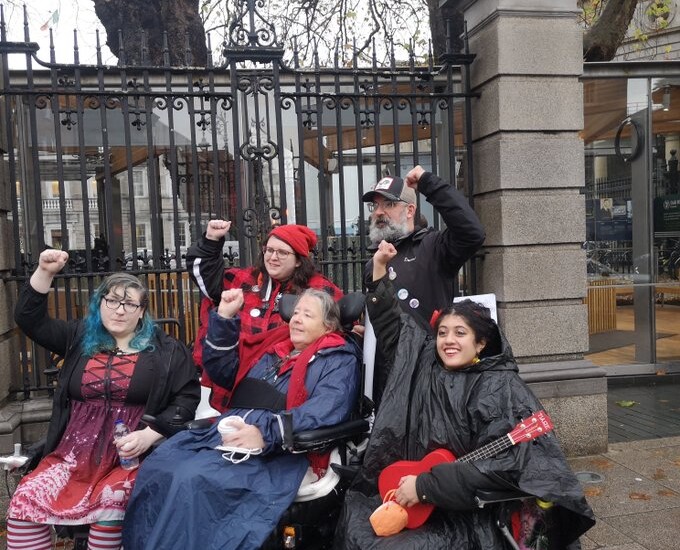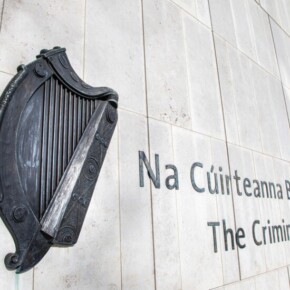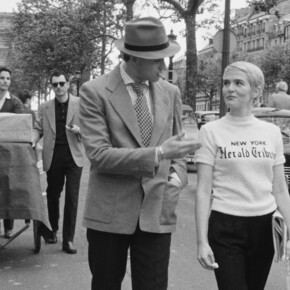“Insulting” disability reforms protested outside Dáil
Mike Finnerty 13 Dec 2023
Advocacy groups and political representatives have criticised the Green Paper, an attempt by the Department of Social Protection to make disability services in Ireland a tiered system.
The chairperson of Disability Power Ireland, Maryam Madani, has criticised the lack of inclusion of disability groups in the preparation of a Green Paper by the Department of Social Protection which proposes reforming the structure of long-term disability payments by establishing a three-tiered system.
Madani told RTÉ that the Green Paper did not include proposals to remove societal barriers to employment, namely improving workplace accessibility or disability equality training for employers.
“We will be categorised into tiers based solely on the perception of our capacity to work from independent medical assessors,” she said.
A coalition of disability groups took part in a protest outside the Dáil on Thursday afternoon to oppose the reforms.
The coalition is made up of disability advocacy groups across the country, such as Disabled Women Ireland, Neruo Pride Ireland and Access For All Ireland, and some protesters travelled from Clare and Sligo to protest outside the Dáil.
Independent Senator Tom Clonan told the Seanad in October that the proposed changes were “like something out of Dickens.”
“This policy can only be successful if it determines that people are fit for work. If people do not comply with the Department, they could be struck off and lose their benefits. We need reassurances about that. Otherwise, there is no point in spending large sums of money on trying to assess people,” he said at the time.
The Department of Social Protection insist that the proposals are designed for public consultation and no final decision has been made, with public consultations open until March.
The Department identified a “twin challenge” of insulating people who cannot work from experiencing poverty as well as supporting a higher rate of employment for disabled people.
The Department dismissed claims that it was a cost-cutting measure, saying the changes proposed would cost an additional €130 million per year.
In a statement, the Department said “nobody will lose their entitlement to a disability payment arising from the Green Paper proposals, nor will they see that payment level reduced.”
They asserted they were committed to enhancing support for people with disabilities and that increased payments were among the measures taken in Budget 2024.
Madani said the reforms were “brought in under our noses without giving sufficient time for disabled people to be able to understand the proposals.”
Social Democrats leader Holly Cairns compared the reforms to austerity-era measures implemented in the United Kingdom following the 2008 economic downturn.
“Although couched in language of care, this proposal from the Minister for Social Protection would demonise people with disabilities and blame them for the Government’s failures,” Cairns said.
“Under the plan, disabled people would be subjected to a medical assessment and categorised into three tiers based on their ability to work. Those with no capacity to work would get a slightly higher weekly payment – the others will be expected to take up training or find a job.”
Calling the proposal “insulting,” Cairns said it was a “carbon copy” of the UK’s austerity measures.
“The Government is trying to justify the measure on the basis that Ireland has the lowest rate of employment for disabled people in the EU. However, the plan fails to explain the reasons for this or identify the barriers that prevent people with disabilities from taking up work.
“If the Government genuinely wants to reform the area of disability, it needs to stop treating disabled people as second-class citizens,” she said.
Labour Senator Marie Sherlock took part in the demonstration outside the Dáil, and asked “why is this Government spending precious time on proposals that would categorise disabled people for work?
“They need more supports, not more labels.”
Addressing the crowd outside the Dáil, Sinn Féin leader Mary Lou McDonald said that disability campaigners “are their strongest and best advocates.”
“We (as politicians) need to stand shoulder to shoulder with you.”
McDonald said she would deliver a letter from the advocates to the Dáil, and she called on all parties that are represented in the Dáil to listen to the needs of people with disabilities.











